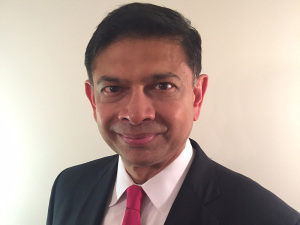by
Gus Iversen, Editor in Chief | November 25, 2022
From the November 2022 issue of HealthCare Business News magazine
Earlier this year, Huntsman Cancer Institute (HCI) at the University of Utah Health (U of U Health) announced that Dr. Amit Maity would serve as professor and chair of the department of radiation oncology for the Spencer Fox Eccles School of Medicine at University of Utah.
HealthCare Business News checked in with Dr. Maity to learn more about his background in medicine, what drew him to Huntsman, and how the first several months have gone in his new role.
HCB News: Who or what inspired you to pursue a career in cancer treatment?



Ad Statistics
Times Displayed: 137929
Times Visited: 7957 MIT labs, experts in Multi-Vendor component level repair of: MRI Coils, RF amplifiers, Gradient Amplifiers Contrast Media Injectors. System repairs, sub-assembly repairs, component level repairs, refurbish/calibrate. info@mitlabsusa.com/+1 (305) 470-8013
Dr. Amit Maity: I became very interested in oncology in the 1980s because of all the advances occurring at that time in our understanding of the biology of cancer development. I started a residency in internal medicine with the goal of doing a fellowship in hematology-oncology. However, during my internship I met some 4th-year students who were pursuing radiation oncology and learned about the field. I did rotations in radiation oncology and became fascinated by the field and decide to apply for a second residency after I completed my residency in internal medicine.
HCB News: Can you tell us what your career has been like up to this point?
AM: I began my career in radiation oncology at the University of Pennsylvania. After I completed my residency, I pursued a Ph.D. degree. I then pursued a post-doctoral fellowship at Johns Hopkins and then became a faculty member in the department at Penn. During my time as faculty at Penn I always maintained a wet lab, but I have had many clinical roles. I treated pediatric cancer patients from Children’s Hospital of Philadelphia (CHOP) for many years and then switched to treating lung and prostate cancer at the Philadelphia VA. Over the past twelve years I have been treating hematologic malignancies.
During my time at Penn, I have also taken on many different leadership roles including being chief of radiation oncology at the Philadelphia VA Hospital, chair of the Quality Assurance (QA)/Quality Improvement (QI) Committee, vice chair of clinic for the department, and over the past several years executive vice chair of the department. In this latter role I oversaw many aspects of the department including supervising the running of 17 satellite facilities. After these different leadership roles at Penn, the move into a chair position was a natural step for me.
HCB News: What drew you to Huntsman Cancer Institute and University of Utah Health?
AM: As I was interviewing for this position, I realized that Radiation Oncology at U Utah is a phenomenal department that gives exceptional patient care. The faculty and staff there are engaged and genuinely care about improving life in the intermountain region. I did feel that there was an opportunity to further the research that was being conducted in the department, specifically by collaborating with people outside the department. What drew me to Huntsman Cancer Institute and University of Utah Health is that I sensed a real spirit of collegiality and collaboration between clinicians and researchers at both HCI and U Utah Health. Hence, I feel that I will be able to promote research collaborations between faculty in Radiation Oncology and other departments and fields that will yield exciting, novel ideas.

